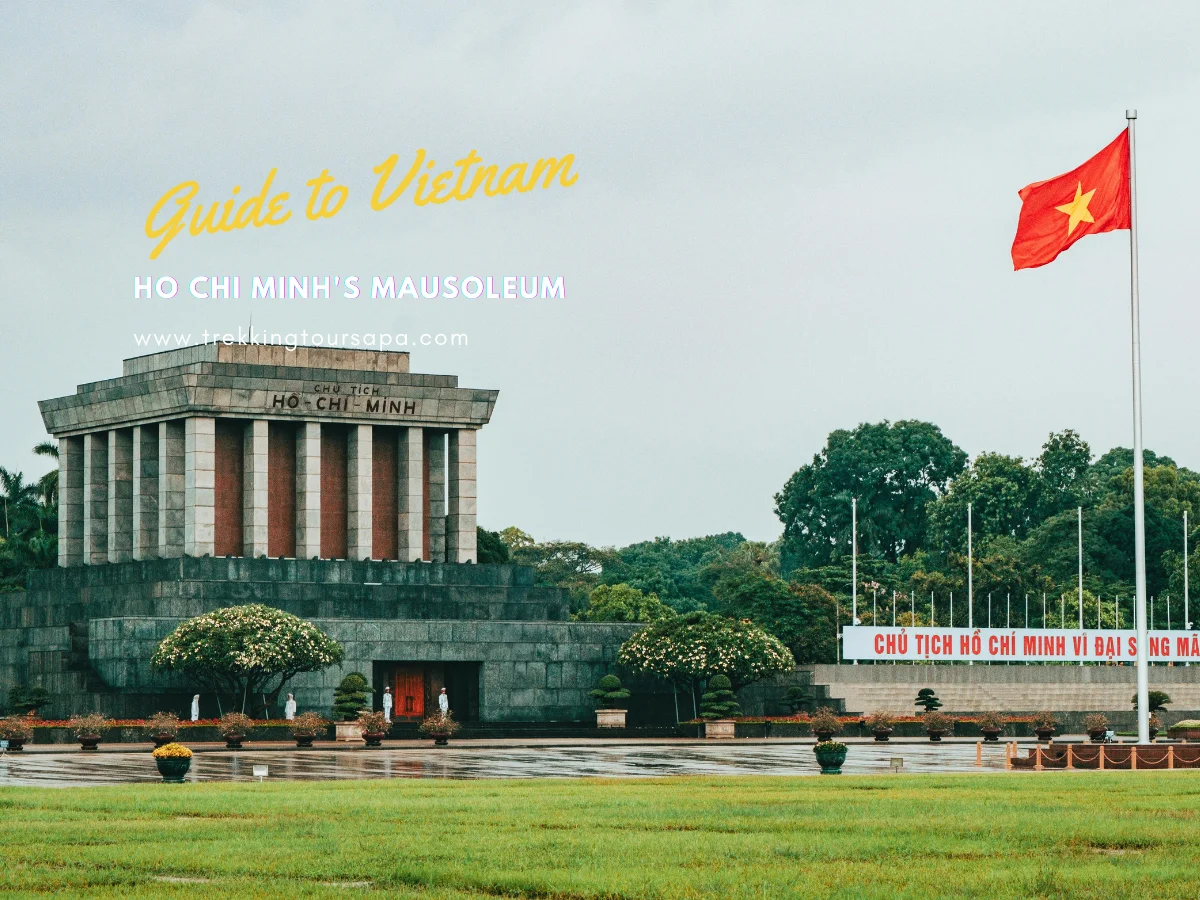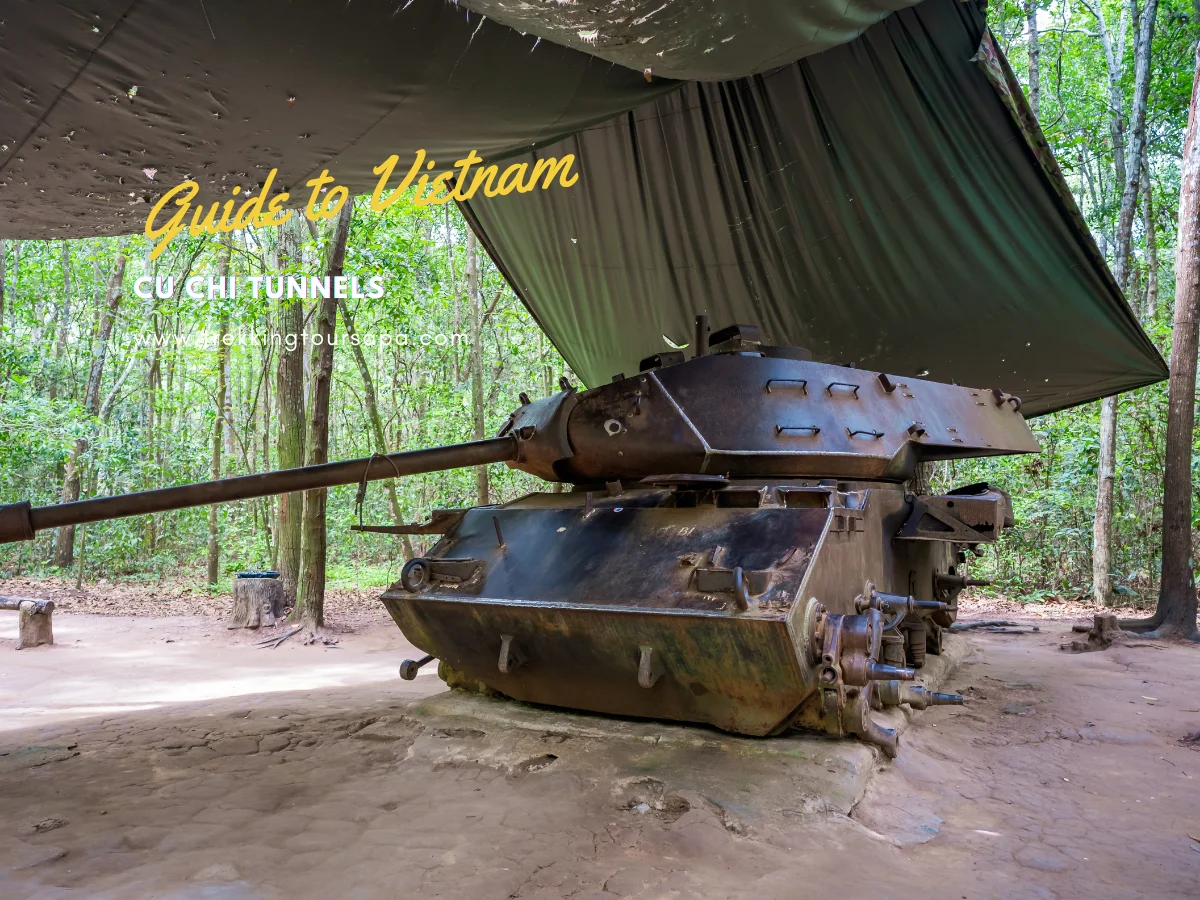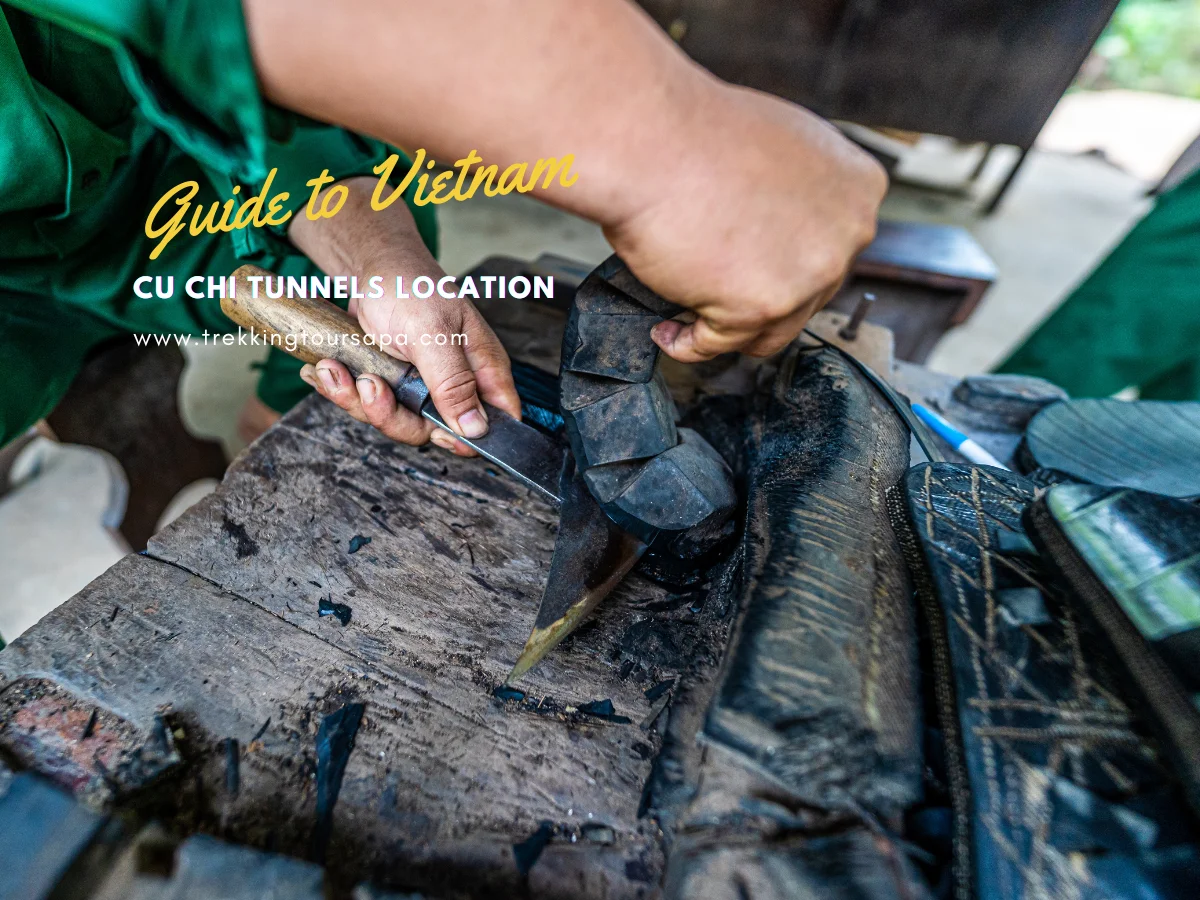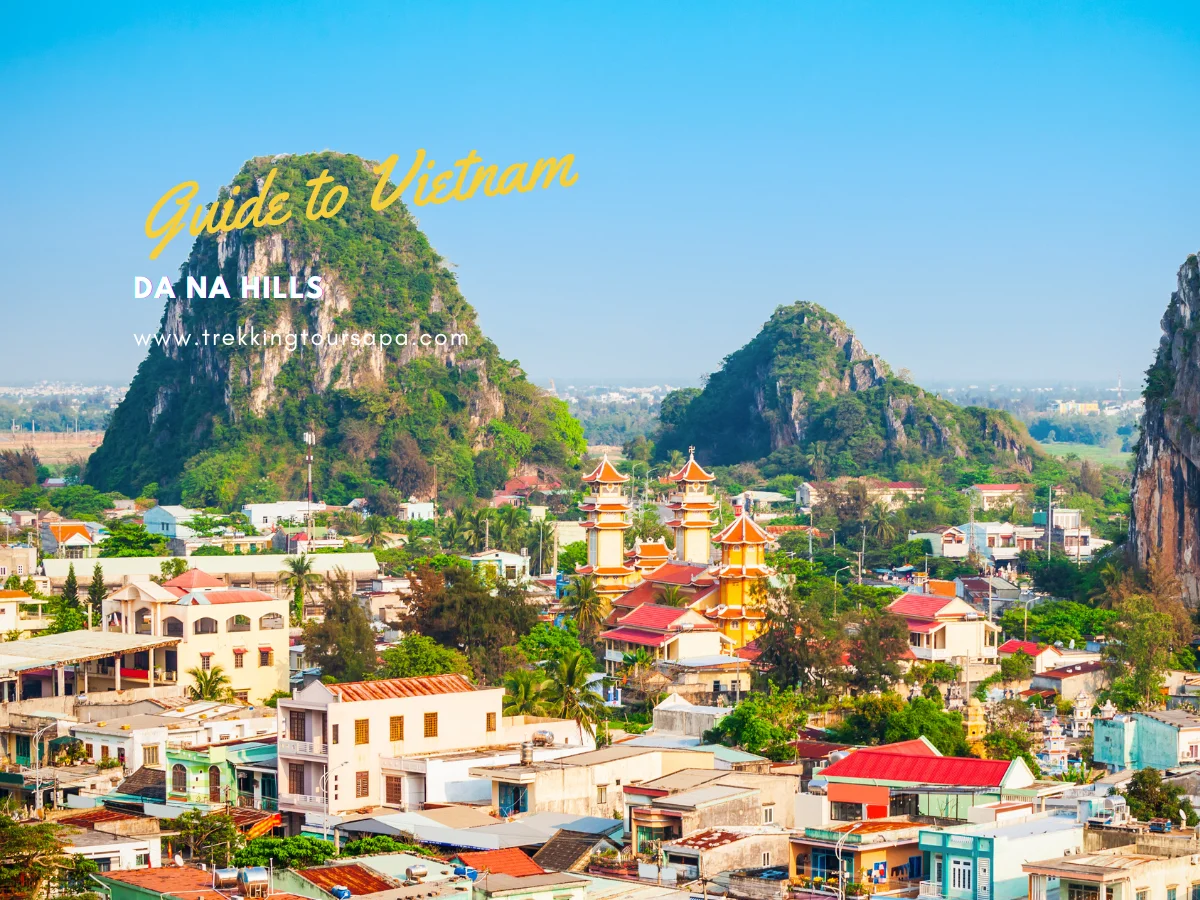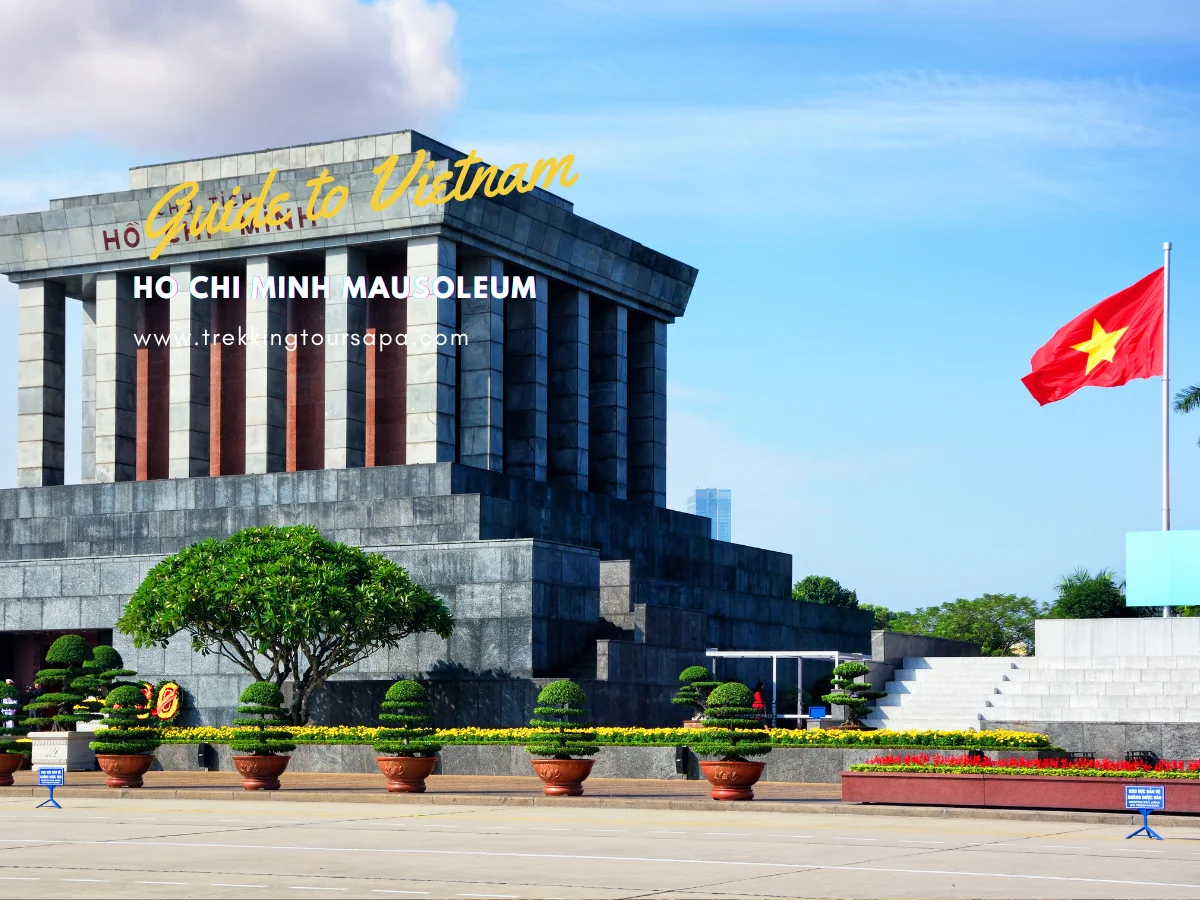The Ho Chi Minh’s Mausoleum is a key spot in Hanoi, Vietnam. It honors the leader who greatly influenced the nation. This grand building is more than a resting place; it symbolizes unity and pride for the Vietnamese.
Every year, thousands visit this national monument. They get to see history and think about Ho Chi Minh’s impact on Vietnam’s fight for freedom.
The mausoleum is in Ba Dinh Square, at the heart of Hanoi. It shows the nation’s strength and courage in its fight for freedom. Built from 1973 to 1975, it attracts admiration from both locals and tourists. It reminds us of Vietnam’s history and its founding leader’s vision. To learn more, click here.
Key Takeaways
- Ho Chi Minh’s Mausoleum is located in central Hanoi, specifically in Ba Dinh Square.
- This national monument symbolizes Vietnam’s fight for independence and unity.
- The mausoleum was constructed between 1973 and 1975, showcasing architectural significance.
- Visitors can expect strict dress codes and regulations when visiting the mausoleum.
- The site includes other historical attractions like Ho Chi Minh’s Stilt House and the One Pillar Pagoda.
- Opening hours vary throughout the week, with specific days closed to visitors.
Table of Contents
ToggleIntroduction to Ho Chi Minh’s Mausoleum
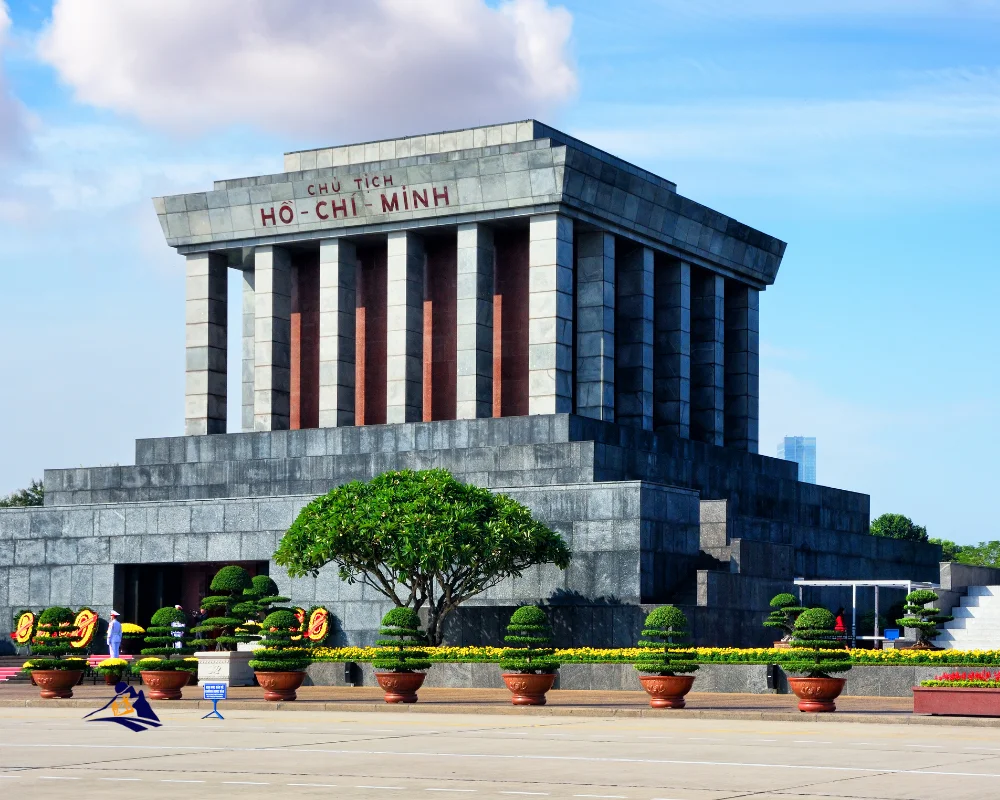
In the heart of Hanoi, Ho Chi Minh’s Mausoleum is a key landmark. It honors Vietnam’s much-loved leader. The mausoleum shows Ho Chi Minh’s simple and humble nature. It was built from 1973 to 1975, marking his 85th birthday.
When you get close, you’ll see its grand design. It’s 21.6 meters high and 41.2 meters wide. It welcomes over 15,000 visitors weekly, showing the respect for the leader. Since opening, nearly 50 million have visited, including 7 million from abroad.
The area around the mausoleum includes the Presidential Palace and Ho Chi Minh’s stilt house. These sites give a full view of Vietnam’s history. They show Ho Chi Minh’s life and the era that changed Vietnam. The mausoleum is visited by many, showing the lasting impact of the leader.
Visiting Ho Chi Minh’s Mausoleum is a special way to honor Vietnam’s past. It also lets you see the country’s lively culture today. The mausoleum is open five days a week, making it easy for everyone to visit.
Historical Significance of Ho Chi Minh
Ho Chi Minh, born Nguyen Sinh Cung, became a key leader in Vietnam’s fight for freedom. This revolutionary figure laid the groundwork for future generations. His dream of a united Vietnam was especially important during the Vietnam War.
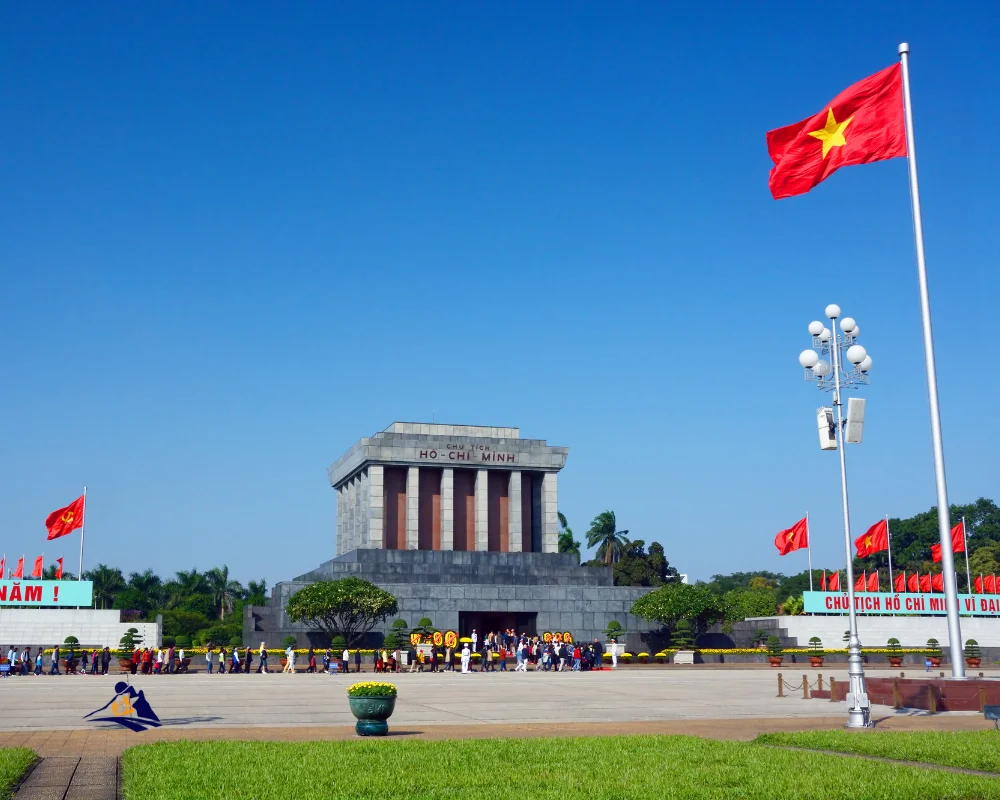
As the Vietnam War leader, he rallied people against colonial powers. He fought for the rights and dignity of the Vietnamese people.
In 1945, Ho Chi Minh declared the Democratic Republic of Vietnam. This was a major moment in Vietnam’s history. It made him a symbol of freedom and anti-colonialism.
His leadership paved the way for big changes in the country. Ho Chi Minh’s spirit shows Vietnam’s strength against foreign rule and its quest for self-rule.
The Ho Chi Minh Mausoleum honors his impact and vision. It attracts visitors wanting to connect with this revolutionary figure. The mausoleum was built from 1973 to 1975, showing the Vietnamese people’s deep respect for him.
Ho Chi Minh’s work goes beyond his lifetime. He remains a symbol of Vietnam’s path to unity and freedom.
The Design and Architecture of the Mausoleum
Ho Chi Minh’s Mausoleum is a stunning example of mausoleum architecture. It combines modern and traditional Vietnamese design. Built from 1973 to 1975, it honors Vietnam’s leader and symbolizes national pride.
Influences from Global Architectural Styles
Sapa 1 Day Tours

- 1 day experience
- Moderate to challenging
- Cultural immersion & active adventure
- Rice fields, valleys & villages
- Private tours
- Vegan-friendly
Sapa 2 Day Tours

- 2 days 1 night experience
- Moderate to challenging
- Cultural immersion & active adventure
- Mountains, valleys, rice fields and villages
- Private tours
- Vegan-friendly
Sapa 3 Day Tours
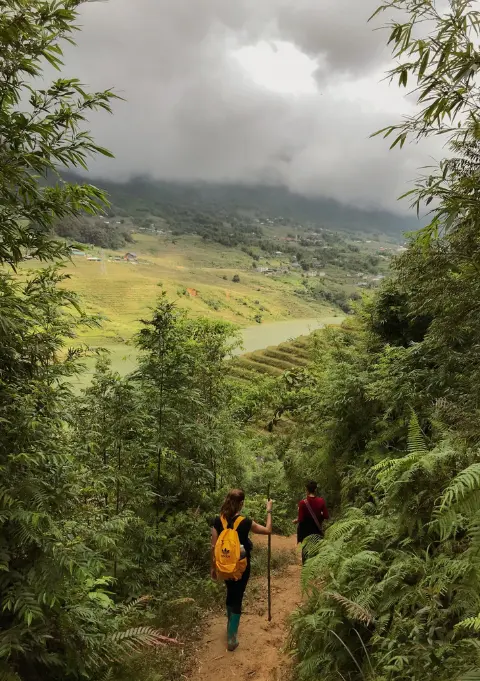
- 3 days 2 night experience
- Moderate to challenging
- Cultural immersion & active adventure
- Mountains, valley, rice fields & villages
- Private tours
- Vegan-friendly
Sapa 4 Day Tours

- 4 days 3 night experience
- Moderate to challenging
- Cultural immersion & active adventure
- Mountains, valleys, rice fields & villages
- Private tours – Less Touristic
- Vegan-friendly
This architectural wonder takes inspiration from around the world. It’s especially influenced by Lenin’s Mausoleum in Moscow. Its granite exterior shows strength, and its three-tiered roof blends modern and traditional styles.
Visitors to Ho Chi Minh’s mausoleum see a mix of international styles. This makes it a significant historical landmark.
Traditional Vietnamese Motifs in the Design
The mausoleum features traditional Vietnamese motifs. These motifs show the country’s rich artistic heritage. They add beauty and connect visitors to Vietnamese history and values.
The use of local elements shows the architects’ respect for national identity. It also welcomes visitors from all over, making the mausoleum special for everyone.
| Feature | Details |
|---|---|
| Construction Period | 1973 – 1975 |
| Height | 21.6 meters |
| Width | 41.2 meters |
| Pillars Surrounding Center | 20 marble pillars |
| Architectural Inspiration | Influenced by Lenin’s Mausoleum |
| Significance | Symbol of national identity |
| Traditional Elements | Vietnamese motifs in design |
Location and Accessibility of Ho Chi Minh’s Mausoleum
Ho Chi Minh’s Mausoleum is in the Ba Dinh District, right in Hanoi’s heart. This spot makes it easy for visitors to honor Vietnam’s leader. It’s at 2 Hung Vuong, a key spot among Hanoi landmarks.

Getting there is easy with many transport options. Buses 9, 36, and 46 stop nearby. Taxis take about 20-30 minutes, depending on traffic. Or, you can walk from the Old Quarter in 30-40 minutes.
Around the mausoleum, you’ll find the Presidential Palace, Ho Chi Minh Museum, and One Pillar Pagoda. These places add to the area’s historical value. Together, they offer a deep dive into Vietnam’s past and culture.
Visiting Ho Chi Minh’s Mausoleum: What to Expect
Planning your visit to Ho Chi Minh’s Mausoleum can make your experience better. This site is very important in history. It’s key to follow the tourist guidelines to show respect.
Tourist Guidelines and Dress Code
When you visit, you must wear the right clothes. Your outfit should cover your shoulders and knees. You can wear:
- Long pants or skirts
- Sleeved tops
But, you can’t wear shorts or sleeveless tops. It’s important to be quiet inside. Visitors should act respectfully.
Sapa 1 Day Tours

- 1 day experience
- Moderate to challenging
- Cultural immersion & active adventure
- Rice fields, valleys & villages
- Private tours
- Vegan-friendly
Sapa 2 Day Tours

- 2 days 1 night experience
- Moderate to challenging
- Cultural immersion & active adventure
- Mountains, valleys, rice fields and villages
- Private tours
- Vegan-friendly
Sapa 3 Day Tours

- 3 days 2 night experience
- Moderate to challenging
- Cultural immersion & active adventure
- Mountains, valley, rice fields & villages
- Private tours
- Vegan-friendly
Sapa 4 Day Tours

- 4 days 3 night experience
- Moderate to challenging
- Cultural immersion & active adventure
- Mountains, valleys, rice fields & villages
- Private tours – Less Touristic
- Vegan-friendly
Opening Hours and Ticket Information
Knowing the opening hours is important for planning. The mausoleum opens at:
| Season | Day | Opening Hours |
|---|---|---|
| Summer (April – October) | Tuesday – Sunday | 7:30 AM – 10:30 AM |
| Summer (April – October) | Weekends and Holidays | 7:30 AM – 11:00 AM |
| Winter (November – March) | Tuesday – Sunday | 8:00 AM – 11:00 AM |
| Winter (November – March) | Weekends and Holidays | 8:00 AM – 11:30 AM |
International visitors pay about 25,000 VND to enter. Vietnamese citizens get in for free. Some events might change the opening hours. So, check the dates for National Day on September 2nd.
Understanding the Embalmed Body Viewing
Visiting Ho Chi Minh’s embalmed body is a key part of the mausoleum experience. The preservation of his body lets visitors pay their respects in a special way. It’s a chance to see him in a way that’s both unique and historically important.
The process to keep his body in good condition is very detailed. It ensures that Ho Chi Minh’s remains are well cared for and shown to the public. It’s also important to understand the right way to act during this visit. This makes the moment even more meaningful.
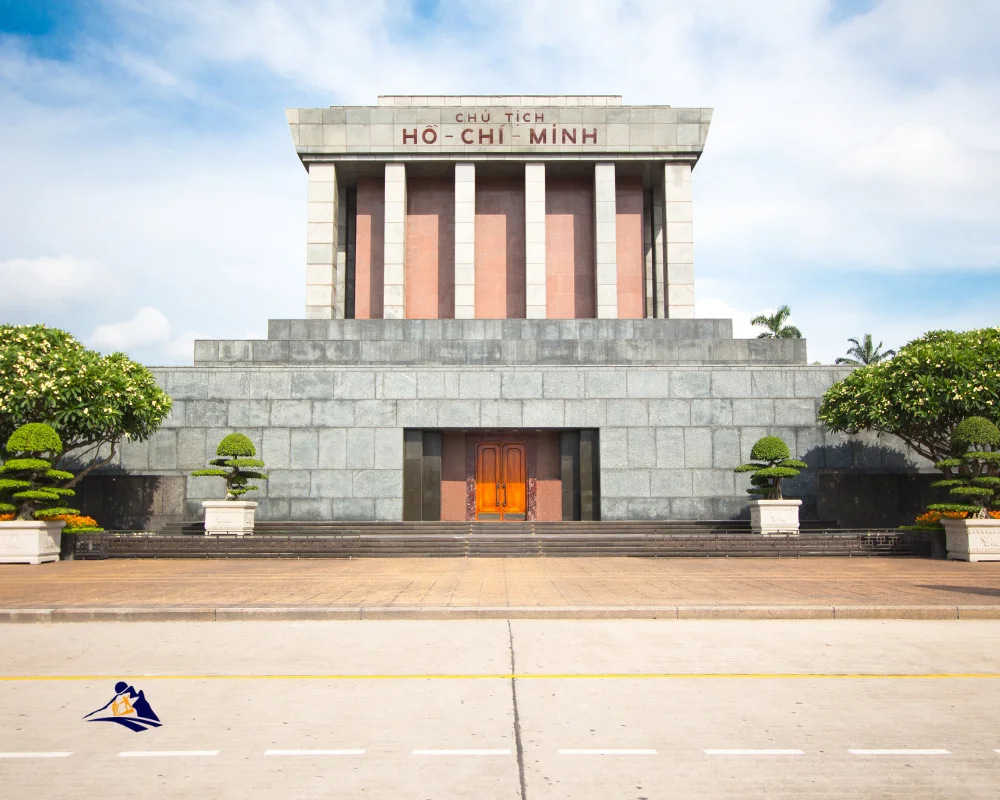
The Process of Preservation
Ho Chi Minh’s body is kept in a glass case, under special conditions. The preservation method is similar to others, aiming for long-lasting preservation. It includes regular checks and climate control to prevent damage.
Visitors can see the effort put into keeping Ho Chi Minh’s legacy alive. It shows his lasting impact on Vietnam.
Respectful Etiquette While Viewing
When you visit, it’s important to follow certain rules. These rules help keep the atmosphere respectful and solemn.
- Maintain silence throughout the viewing.
- Exhibit reverence towards Ho Chi Minh.
- Follow museum-like guidelines for behavior in the mausoleum.
By following these rules, you honor Ho Chi Minh’s legacy. You also help create a fitting atmosphere for such a historic site.
Other Attractions Near Ho Chi Minh’s Mausoleum
When you visit Ho Chi Minh’s Mausoleum, you’ll find many amazing places nearby. The Presidential Palace and the One Pillar Pagoda are two highlights. They offer a deep dive into Vietnam’s history and architecture.
The Presidential Palace Historical Site

The Presidential Palace is a beautiful example of French colonial style. It was once the home and office of the President of South Vietnam during the war. Today, it’s a historical site with beautiful gardens and water features.
You can see different rooms and learn about important events in Vietnam’s history.
Visiting the One Pillar Pagoda
The One Pillar Pagoda is a famous landmark in Hanoi. It’s known for its unique design, shaped like a lotus flower. The pagoda stands on a single stone pillar in a small lake.
It’s a place of deep history and spirituality. Thousands of people visit every year to see its beauty and significance.
| Attraction | Description | Historical Importance |
|---|---|---|
| Presidential Palace | French colonial architectural marvel surrounded by gardens | Former residence of the President of South Vietnam |
| One Pillar Pagoda | Unique pagoda built on a single stone pillar | Symbol of Vietnamese culture and spirituality |
These places near Ho Chi Minh’s Mausoleum offer a deeper look into Vietnam’s history and architecture. They make your visit to this important landmark even more special.

The Legacy of Ho Chi Minh in Vietnamese History
Ho Chi Minh’s legacy has greatly influenced Vietnamese history since his death in 1969. He was a national hero who inspired many to fight for independence. His teachings still guide Vietnam’s politics and values today.
The Ho Chi Minh Mausoleum was opened on May 19, 1975. It honors this important leader. The mausoleum shows the Vietnamese people’s deep respect for Ho Chi Minh. It’s surrounded by beautiful gardens with over 250 plant species.
The mausoleum’s design holds cultural importance. The phrase “CHỦ TỊCH HỒ-CHÍ-MINH” is written in crimson jade stone. Its 200 doors are made from rare Vietnamese woods, showing great craftsmanship. The building is also designed to withstand floods and earthquakes.
Visitors can see the mausoleum’s stunning architecture and its surroundings. When planning your visit, know about the entry fees and guidelines. They are very affordable. For more information on nearby attractions and historical context, check out this detailed guide.
Ho Chi Minh’s Role During the Vietnam War
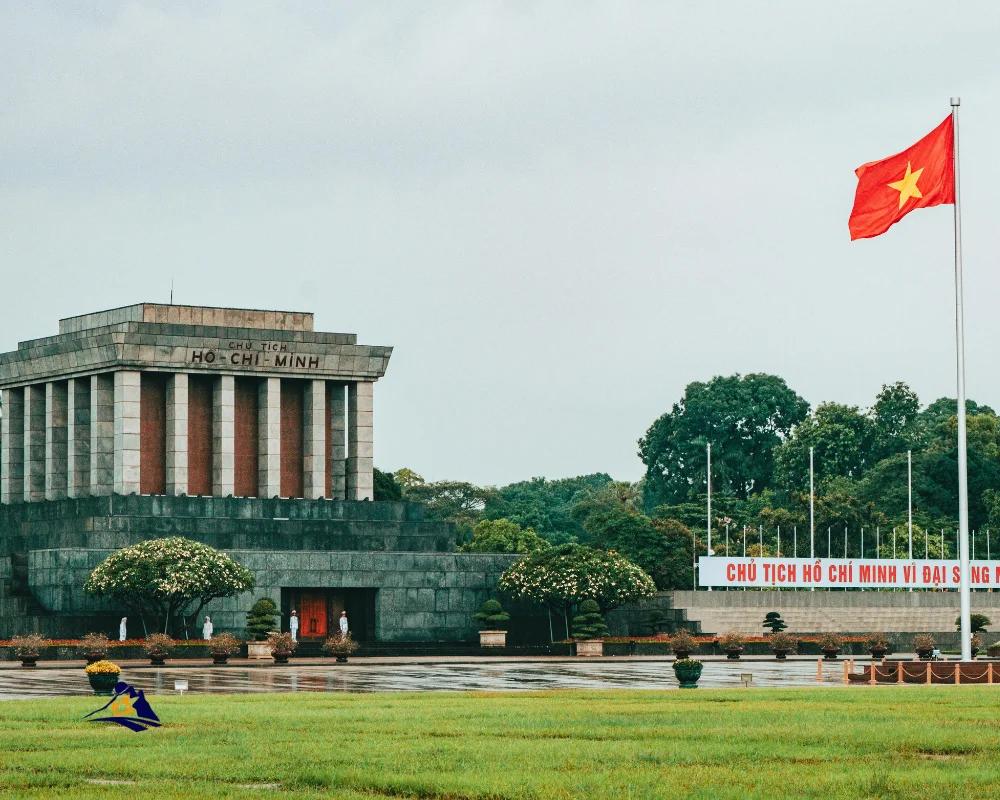
Ho Chi Minh’s role in the Vietnam War shows his strength as a leader and his vision for the nation. He led the North Vietnamese with a strong belief in socialism. His efforts led to the joining of North and South Vietnam, ending in the fall of Saigon in 1975.
The Vietnam War was a major conflict of the 20th century, with over 58,000 Americans dying. The Vietnam Veterans Memorial honors those who fought. Ho Chi Minh’s Mausoleum, on the other hand, celebrates the leader who inspired many to fight for freedom.
Every year, three million people visit the Hồ Chí Minh Mausoleum to honor him. The building, like Lenin’s Mausoleum, shows national pride and a history of revolution. Ho Chi Minh’s leadership is key to understanding Vietnam’s fight against foreign control.
Ho Chi Minh’s military tactics and vision were crucial in shaping Vietnam’s identity. His leadership is remembered for both military victories and his vision. His legacy teaches important lessons about the Vietnam War, still felt today.
| Event | Year | Significance |
|---|---|---|
| Fall of Saigon | 1975 | Marked unification of Vietnam |
| French Capture of Saigon | 1859 | Beginning of colonial rule |
| Establishment of Ho Chi Minh City Population | 2009 | Population reached 5,880,615 |
| Opening of Ho Chi Minh War Remnants Museum | Not specified | Educational resource highlighting war’s impacts |
Importance of Ho Chi Minh’s Mausoleum as a National Monument
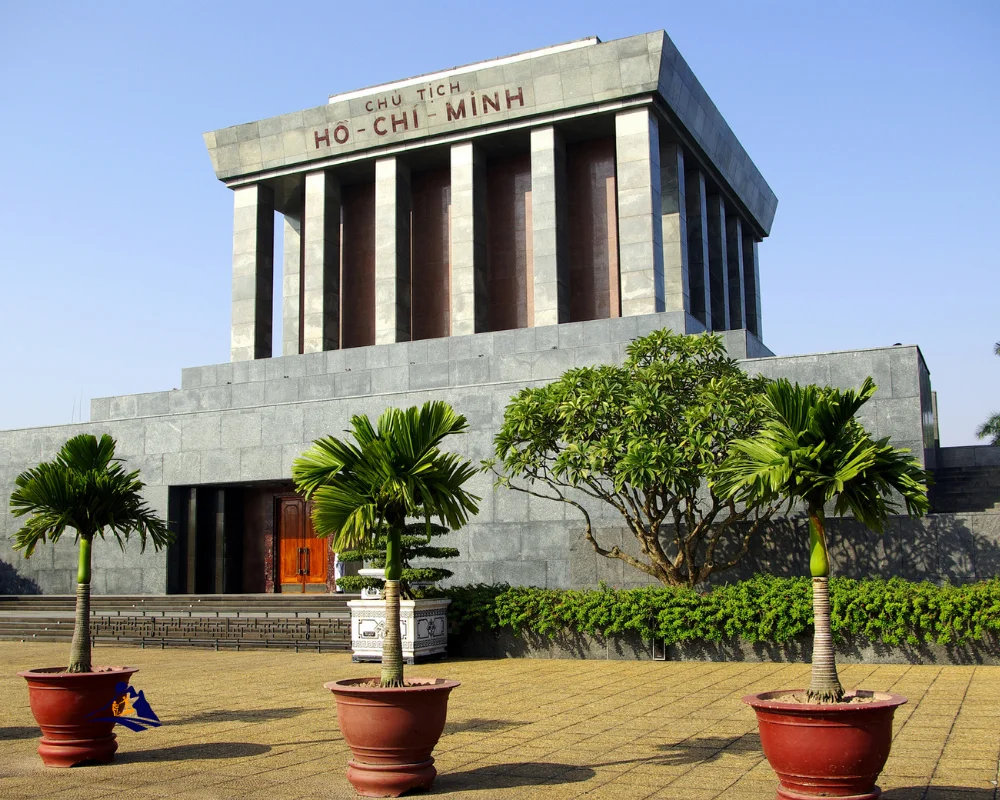
Ho Chi Minh’s Mausoleum is a key national monument. It shows the heart of Vietnam’s identity and history. This structure is not just a memorial for a loved leader. It also shows the national pride of the Vietnamese people.
It was opened on August 29, 1975. Since then, it has inspired people to remember and think about Ho Chi Minh’s work for the nation.
Symbol of National Pride and Unity
The mausoleum is a symbol of national pride and unity. When people visit, they feel respect and admiration for Ho Chi Minh’s legacy. It’s a place where people come together to honor him.
It hosts many events throughout the year. These events show the shared memory and identity of the Vietnamese people.
Place for National Commemorations
Every year, the mausoleum is the center of national commemorations. Thousands come to pay their respects. It’s not just for official ceremonies but also for unity among citizens.
Sapa 1 Day Tours

- 1 day experience
- Moderate to challenging
- Cultural immersion & active adventure
- Rice fields, valleys & villages
- Private tours
- Vegan-friendly
Sapa 2 Day Tours

- 2 days 1 night experience
- Moderate to challenging
- Cultural immersion & active adventure
- Mountains, valleys, rice fields and villages
- Private tours
- Vegan-friendly
Sapa 3 Day Tours

- 3 days 2 night experience
- Moderate to challenging
- Cultural immersion & active adventure
- Mountains, valley, rice fields & villages
- Private tours
- Vegan-friendly
Sapa 4 Day Tours

- 4 days 3 night experience
- Moderate to challenging
- Cultural immersion & active adventure
- Mountains, valleys, rice fields & villages
- Private tours – Less Touristic
- Vegan-friendly
Visitors learn about Ho Chi Minh’s role in Vietnam’s history. This helps them understand the country’s cultural heritage and the ho chi minh’s mausoleum significance.
| Feature | Description |
|---|---|
| Inauguration Date | August 29, 1975 |
| Visitor Fees (Foreign) | 25,000 VND (approx. US$1) |
| Visiting Hours (Summer) | Tuesdays: 7:30 AM – 10:30 AM; Saturdays: 8:00 AM – 11:00 AM |
| Visiting Hours (Winter) | Tuesdays: 8:00 AM – 11:00 AM; Saturdays: 8:00 AM – 11:30 AM |
| Size of Complex | More than 320,000 square meters |
| Notable Features | Embalmed remains of Ho Chi Minh, flag-raising ceremony |
Guided Tours Available for Visitors
Exploring Ho Chi Minh’s Mausoleum through guided tours is a rich experience. You get to see the site and learn about its history and design. Knowledgeable guides share insights into Ho Chi Minh’s life and Vietnamese history.
Booking Options
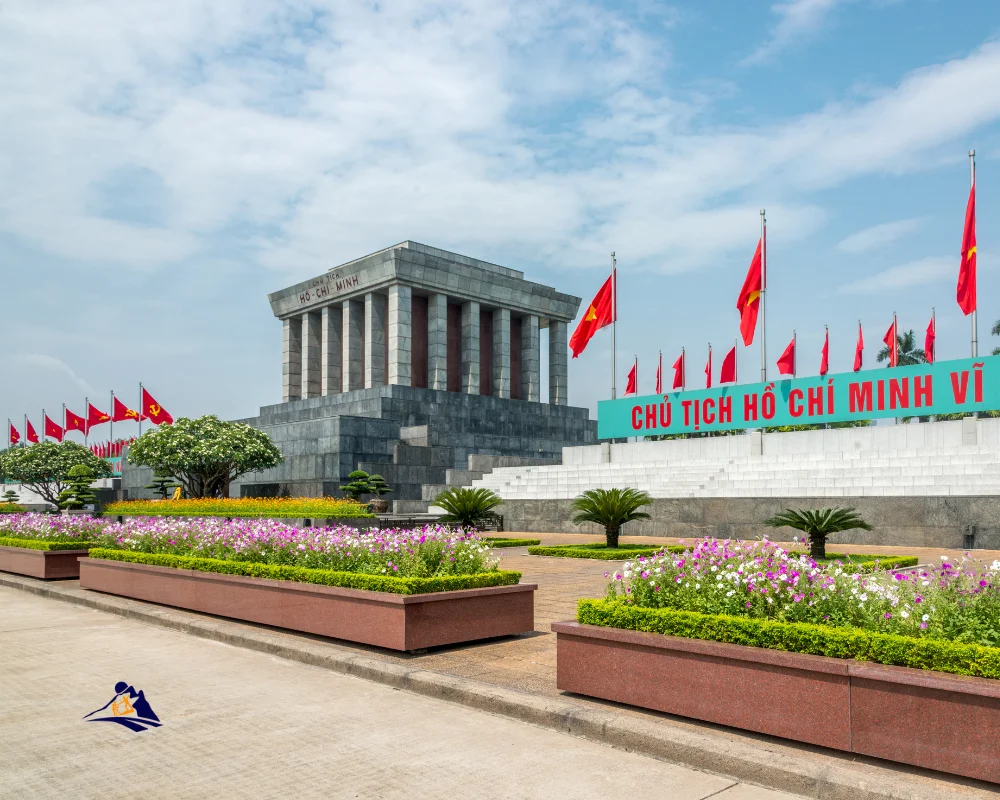
There are many ways to book guided tours of Ho Chi Minh’s Mausoleum. Local tour operators offer packages with transportation and guides. You can book online or in person in Hanoi. It’s best to book early, especially during busy seasons.
What You’ll Learn on a Guided Tour
On your tour, you’ll learn about Ho Chi Minh’s important role in Vietnam’s history. You’ll hear about:
- The historical context of Ho Chi Minh’s leadership.
- The architectural aspects of the mausoleum and its symbolic significance.
- Details about the embalming process that preserves Ho Chi Minh’s body.
- The cultural and national importance of the site for the Vietnamese people.
Guided tours last 1 to 2 hours. This gives you enough time to see the mausoleum and nearby attractions like the Stilt House and the One Pillar Pagoda.
How to Prepare for Your Visit to Hanoi
Traveling to Hanoi for Ho Chi Minh’s Mausoleum needs careful planning. Knowing the city’s many attractions can enhance your trip. Make sure to include other sights in your plan.
It’s important to know the mausoleum’s opening days. It’s open on Tuesdays, Wednesdays, Thursdays, Saturdays, and Sundays. Plan your visit between 8:00 AM to 11:00 AM or 1:30 PM to 5:30 PM.
Visiting costs a small entrance fee of 25,000 VNĐ (about $1.00). The mausoleum is close to other key spots. You can see Ho Chi Minh’s stilt house or the Ho Chi Minh Museum with over 200 valuable items.

When moving around Hanoi, remember taxi fares are 12,000 to 15,000 VNĐ per kilometer. This helps you plan your budget and get around easily.
Also, respect local customs, like dressing properly at historical sites. Learning about these customs makes your visit more meaningful. You’ll get to enjoy Hanoi’s rich culture and history fully.
Cultural Insights: Understanding Vietnam’s Revolutionary Figure
To truly understand Ho Chi Minh, we must look at the cultural context of his time. Born on May 19, 1890, he was deeply committed to Vietnam’s freedom and unity. His efforts greatly impacted the country, especially in the 20th century.
Ho Chi Minh played a key role in founding the Viet Minh in 1941. This showed his strong will against colonial rule. His declaration of Vietnam’s independence on September 2, 1945 was a turning point. It led Vietnam towards self-rule.
His leadership during the Vietnam War was marked by smart guerrilla tactics. This left a lasting mark on Vietnam’s identity.
Looking at Ho Chi Minh’s cultural significance is crucial. The Ho Chi Minh Mausoleum, for example, shows the nation’s respect for him. The lotus flower design symbolizes his role in uniting Vietnam.
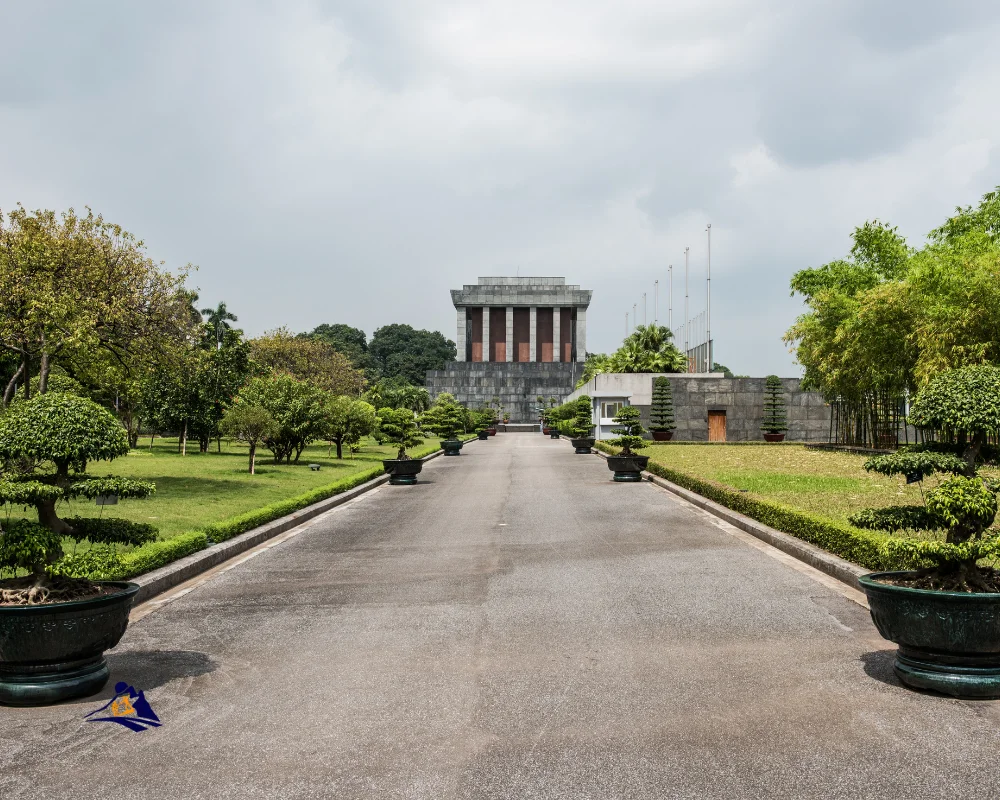
Ho Chi Minh’s impact goes beyond politics and war. His values are woven into Vietnam’s culture. Historic sites and practices show his lasting influence. Cities like Hanoi celebrate his legacy through museums and national events.
To fully understand Ho Chi Minh, diving into Vietnam’s culture is key. Landmarks, traditional foods, and arts offer deep insights into his lasting impact on Vietnamese identity.
Experiencing Hanoi: More than Just the Mausoleum
Visiting Hanoi is more than just seeing Ho Chi Minh’s Mausoleum. The city is alive with street markets and local food spots. Here, you can try real Vietnamese dishes.
The Old Quarter is a must-see. It’s full of life and smells amazing. Every corner is a chance to meet locals and learn about their crafts.
Don’t miss the Temple of Literature and the Hanoi Flag Tower. They show the city’s rich history. Sitting by Hoan Kiem Lake or exploring markets adds to your adventure.
Traveling to Hanoi means being open to new experiences. You’ll find history in museums and tasty street food. It’s a journey that shows the city’s past and present, leaving you with unforgettable memories.
Sapa 1 Day Tours

- 1 day experience
- Moderate to challenging
- Cultural immersion & active adventure
- Rice fields, valleys & villages
- Private tours
- Vegan-friendly
Sapa 2 Day Tours

- 2 days 1 night experience
- Moderate to challenging
- Cultural immersion & active adventure
- Mountains, valleys, rice fields and villages
- Private tours
- Vegan-friendly
Sapa 3 Day Tours

- 3 days 2 night experience
- Moderate to challenging
- Cultural immersion & active adventure
- Mountains, valley, rice fields & villages
- Private tours
- Vegan-friendly
Sapa 4 Day Tours

- 4 days 3 night experience
- Moderate to challenging
- Cultural immersion & active adventure
- Mountains, valleys, rice fields & villages
- Private tours – Less Touristic
- Vegan-friendly
